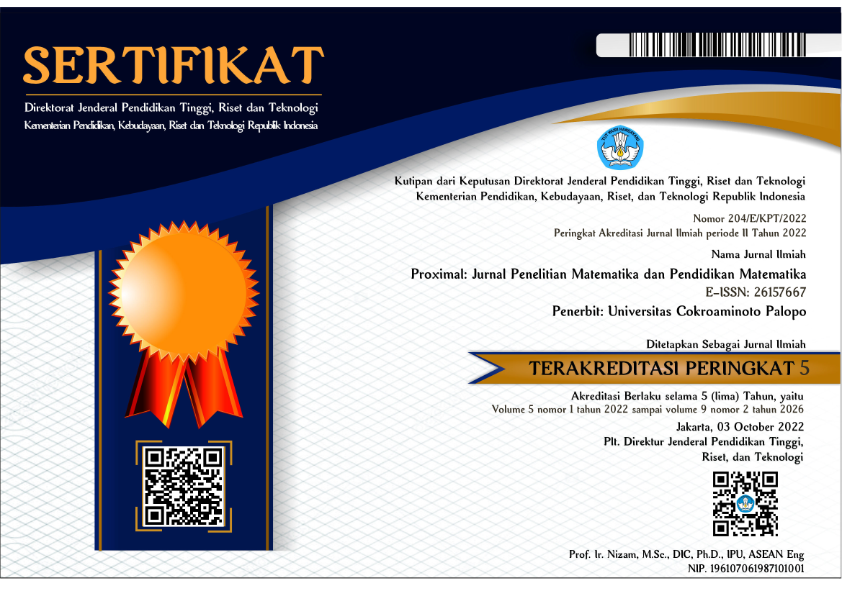TINJAUAN TEORITIS TENTANG PENDEKATAN STEM BERBASIS ETNOMATEMATIKA
Keywords:
STEM, EtnomatematikaAbstract
Era revolusi 4.0 tidak hanya mempengaruhi bisnis, tata kelola, dan masyarakat, tetapi juga mempengaruhi pendidikan. Isu penting pendidikan di era ini salah satunya adalah STEM. Selain itu, dalam pendidikan matematika, etnomatematika juga merupakan kajian yang baru. Dalam pembelajaran STEM peserta didik terlibat dalam eksplorasi STEM melalui pengalaman kreatif langsung. Sementara etnomatematika membantu peserta didik mengaitkan matematika di sekolah dengan dunia nyata dengan menggunakan budaya sebagai media pembelajaran. Pada artikel ini dikaji tentang pendekatan STEM berbasis etnomatematika.
Downloads
References
Fajriyah, Euis. 2018. Peran Etnomatematika Terkait Konsep Matematika dalam Mendukung Literasi. Jurnal Prisma 1: 114-119
Hartono, Y., & Hiltrimartin, C. 2017. Pengembangan Buku Peserta didik Materi Jarak Pada Ruang Dimensi Tiga Berbasis Science, Technology, Engineering, and Mathematics (STEM) Problem-Based Learning di Kelas X. Jurnal Elemen, 3(1): 1–14
Pathuddin & Raehana. 2019. Etnomatematika: Makanan Tradisional Bugis Sebagai Sumber Belajar Matematika. Jurnal Matematika dan Pembelajaran, 7(2): 307-328
Permanasari, Anna. (2016). STEM Education: Inovasi dalam Pembelajaran Sains. Prosiding Seminar Nasional Pendidikan Sains (SNPS): 23-34.
Rakhmawati M, Rosida. (2016). Aktivitas Matematika Berbasis Budaya pada Masyarakat Lampung. Jurnal Pendidikan Matematika. 7(2): 221-230.
Ricardo, R. 2016. Peran Etnomatematika dalam Penerapan Pembelajaran Matematika pada Kurikulum 2013. Jurnal Literasi, 2(2) : 118 – 125.
Sari, R. H. (2017). Pengaruh Implementasi Pembelajaran Stem Terhadap Persepsi, Sikap, dan Kreativitas Peserta didik. Prosiding Seminar Nasional MIPA III,(1): 416–420.
Downloads
Published
How to Cite
Issue
Section
License
In submitting the manuscript to the journal, the authors certify that:
- They are authorized by their co-authors to enter into these arrangements.
- The work described has not been formally published before, except in the form of an abstract or as part of a published lecture, review, thesis, or overlay journal.
- That it is not under consideration for publication elsewhere,
- That its publication has been approved by all the author(s) and by the responsible authorities – tacitly or explicitly – of the institutes where the work has been carried out.
- They secure the right to reproduce any material that has already been published or copyrighted elsewhere.
- They agree to the following license and copyright agreement.
License and Copyright Agreement
Authors who publish with this journal agree to the following terms:
- Authors retain copyright and grant the journal right of first publication with the work simultaneously licensed under Creative Commons Attribution License (CC BY 4.0) that allows others to share the work with an acknowledgment of the work's authorship and initial publication in this journal.
- Authors are able to enter into separate, additional contractual arrangements for the non-exclusive distribution of the journal's published version of the work (e.g., post it to an institutional repository or publish it in a book), with an acknowledgment of its initial publication in this journal.
- Authors are permitted and encouraged to post their work online (e.g., in institutional repositories or on their website) prior to and during the submission process, as it can lead to productive exchanges, as well as earlier and greater citation of published work.















